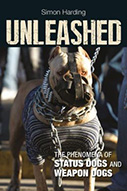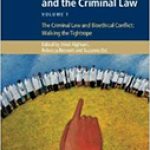Unleashed: The Phenomena of Status Dogs and Weapon Dogs

Author: Simon Harding
Publisher: Bristol, UK: The Policy Press, 2012. 286p.
Reviewer: Rosalyn Bocker Parks | January 2014
Simon Harding’s Unleashed: The Phenomena of Status Dogs and Weapon Dogs moves beyond the existing body of literature on dog fighting and animal abuse to investigate the wider use of canines as both weapons and symbols of power within urban criminal gangs and public housing developments. Harding’s research offers insights not only into the typology of a status dog, but also the motivations and characteristics of their owners, the potential implications of dog fighting and use of these dogs in public spaces, and offers responses to this multifaceted social issue.
Harding’s work examines the use of aggressive canines, particularly the bull breeds, to convey “status” within urban streets gangs and public housing projects. Central to this piece is the UK’s Dangerous Dogs Act of 1991, which legally classified certain breeds, including the Pit Bull Terrier, as potentially dangerous or lethal. Harding argues that ownership of these breeds conveys the message that owners are “above the law” and emulate the same aggression, violence and strength commonly associated with these breeds. In addition to being “fashionable” accessories, these dogs are often used as personal protection for their owners, as weapons against individuals, or in dog fights.
Unleashed also offers insights into the owners of these dogs. Drawing parallels with the “outsider” status notion, Harding argues that the fear and violence associated with popular status dog breeds is also associated with their predominately young, male owners. The culture surrounding status dogs is one of violence, a desire for respect, control and power, and has ties to criminality and gang culture. Harding also highlights the monetary incentives associated with status dog ownership and breeding in low-income communities. Here, UK public housing estates become a literal breeding ground for puppies that can be sold for hundreds of pounds.
While the book’s strengths are many, the evidence provided and literature reviewed in this work are narrow in their scope. While stating that the study of status dogs is “the convergence of sociology, criminology, social policy, animal welfare and human-animal relations,” Harding’s work is hampered by a limited literature review and an acknowledged notable lack of prior academic and policy research in this field. Extant studies reviewed are predominately from the US and are centered on illegal dog fighting rather than the eponymous status dog phenomenon. While parallels between dog-related abuse and crime in the UK and the US certainly exist, the generalizations made here are at once too broad and too poorly supported to establish a transnational typology of status dogs and the related problem of dog fighting.
Even with these deficiencies, Unleashed: The Phenomena of Status Dogs and Weapon Dogs offers an insightful and well written analysis of the use of dogs as both a weapon and a sign of social standing within urban communities. This work offers a unique view of the underlying social and economic factors contributing to the problem of status dogs and associated criminality.
Rosalyn Bocker Parks is a PhD Student at Rutgers University, School of Criminal Justice – Newark, NJ.


